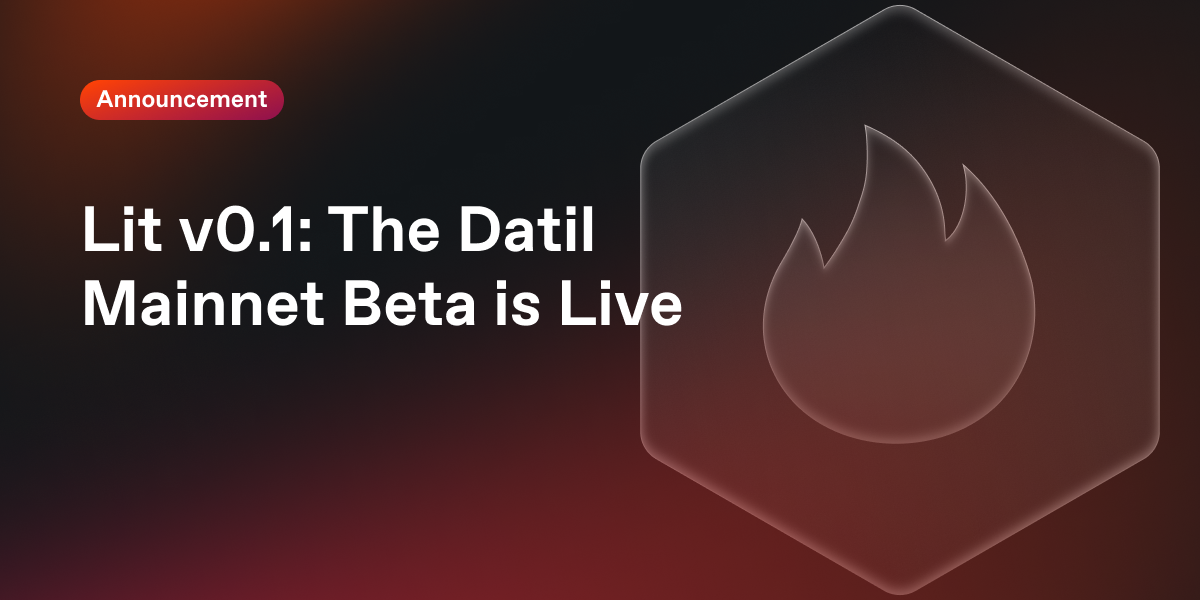Lit v0.1: The Datil Mainnet Beta is Live
The latest version of Lit is now live.

The Datil Mainnet Beta is now live! With this Lit Protocol network, you can manage real world assets. The latest version of the Lit SDK connects to Datil and can be used to start building on the network today. The Datil networks (mainnet, test, dev) are an upgrade to the Lit v0 networks that were released earlier this year. You can read more about the transition here.
A first of its kind decentralized key management network, Lit allows developers to create and manage keys for any use case that demands privacy, fault-tolerance, and programmability. This includes building powerful web3 wallets, private and user-owned social media, open data marketplaces, chain abstraction, cross-chain bridges and messengers, off-chain data oracles, automated DeFi applications, and so much more.
With the launch of Datil, Lit moves one step closer to achieving its driving mission: advancing digital ownership and delivering a new primitive for data sovereignty and security to users of the Web. This is achieved by eliminating single points of control and by making signing / encryption services that developers can deploy with ease.
Get started today.
Quick Links
- You can use these docs to learn how to connect to the new Datil network using the Lit SDK
- You can follow this migration guide to learn how to move your data to Datil from a previous Lit network
- The latest version of the audited, open source node code can be found here
- Check out the new Lit Explorer where you can easily mint and manage PKPs, capacity credits, or write your first Lit Action
- A list of the Datil node operators can be found here
Datil Networks
The Lit Datil networks are now live and ready for use. These networks resolve performance and stability issues affecting previous 'v0' Lit networks (Habanero, Manzano, and Cayenne) and are recommended for use by developers going forward. The previous v0 networks have been deprecated and using them is no longer advised. The v0 networks are NOT being shut down today, but will be shut down after all key material on these networks has been successfully migrated over to Datil.
The three new Datil networks are:
- “Datil”: decentralized mainnet designed for production use cases.
- “Datil-Test”: decentralized testnet designed for pre-production deployment.
- “Datil-Dev”: centralized testnet designed for early-stage development.
If you’re building with Lit for the first time, you can use these docs to connect to the applicable Datil network based on your current stage in the development process.
If you were previously deployed to one of the v0 networks (Habanero, Manzano, or Cayenne), you can follow this migration guide to learn how to bring your data over to Datil. If the migration guide does not cover your application’s unique setup, please join the Lit Builders Circle on Telegram for support.
You’ll also need to ensure that you’ve updated your chain configuration to use the new Chronicle Yellowstone rollup and have the necessary test tokens (tstLPX) in your wallet. These tokens can be claimed from the verified faucet. Just like the networks that preceded it, Datil uses a test token for payments. This token has no real world value and should only be used to pay for gas or mint capacity on Datil.
Data Persistence
Please note, Datil is a mainnet while datil-test and datil-dev are test networks. Production applications should be deployed on Datil, where data persistence is guaranteed. datil-test and datil-dev should be used for application and development where data persistence is NOT guaranteed.
Change Log
Several key changes have been made to Lit ahead of the Datil release. Notably:
- Chronicle, the rollup chain our networks rely on, has been replaced by a new Arbitrum Orbit chain (Chronicle Yellowstone) that has significantly improved transaction speed and will help users avoid previous RPC bottlenecks and outages that plagued the network.
- A patch to the AMD SEV-SNP VM code run by each node has been applied, leading to a significant increase in transaction concurrency (TPS) based on internal benchmarking (see below).
- Sign and Decrypt in Lit Actions: this feature introduces two powerful new primitives related to Lit Actions that provide the ability to compute over private data and send transactions directly from within Lit. These features, Decrypt within an Action and Sign within an Action, allow developers to move signing and decryption operations from the user’s computer (client-side) to directly within the Lit sealed compute environment present within each Lit node.
- Wrapped Keys: this feature allows developers to generate a new private key (or import an existing one) within the confines of a Lit node’s TEE using a Lit Action. Wrapped Keys support any chain or signing curve but hold different security assumptions than Programmable Key Pairs (PKPs).
Benchmarks
The following performance benchmarks were recorded on Lit’s internaldev network. This is a centralized testnet with 7 nodes, most closely reflecting the performance that can be expected on Lit’s datil-dev network.
Overall, we have observed the Datil network to be more stable and robust compared to the previous Habanero mainnet beta, displaying roughly a 2x improvement in overall performance.
BLS Decryption
When the network was at low load, we observed a single decryption to take approximately 200ms. When the network was at max capacity, it was able to handle up to 600 decryptions in parallel, processing approximately 8 requests per second. Each request took ~4 seconds to complete.
ECDSA Signing
When the network was at low load, we observed a single sign request to take approximately 700ms to complete (using the pkpSign endpoint). When the network was at max capacity, it was able to process 70 signature requests in parallel, at approximately 3 requests per second and ~8 seconds per request.
Please note that the internaldev network where these benchmarks were recorded is being run on smaller boxes (16-core CPUs) compared to the larger 64-core boxes that will be run by node operators on the Datil mainnet. We will have additional metrics to share that reflect the performance improvements on the beefier CPUs in the weeks ahead.
Additionally, all Datil node operators will soon be upgraded to use a local rollup instance instead of a remote RPC. This will greatly increase the speed of talking to Chronicle Yellowstone to mint PKPs or check associated permissions, among other operations.
Resources for Developers
If you’re a seasoned pro or just getting started, here are some resources to help make your development journey with Lit seamless:
Quick Start Code:
- Using the Lit SDK in the browser
- Using the Lit SDK using Node.js
- Creating wallets with Programmable Key Pairs (PKPs)
- Performing encryption and decryption
- Working with Lit Actions (decentralized serverless)
Check out this repo for even more examples: https://github.com/LIT-Protocol/developer-guides-code/tree/master
Resources:
- Datil token faucet (please note, this is a TEST TOKEN WITH NO REAL VALUE)
- Chronicle Yellowstone chain configuration
- Lit Relayer API Key request form
Additional Links:
Looking Ahead
The Datil launch will be the last prior to the release of Lit v1 later this year. The v1 network will introduce additional performance improvements, a new payment model, and the live Lit Protocol token.
The v1 network will also support key recovery, meaning developers will NOT have to perform manual migration steps (i.e. re-minting PKPs or performing re-encryption) to move over to the network once it is released. Instead, all keys generated on the Datil network will be persistent and automatically available for use when v1 goes live.
Please hold tight for additional information on the v1 network which will be shared in the coming weeks.
Getting Support
We are here to help! If you have questions about the new Datil networks or need help with the deployment or migration process, please reach out to us on Telegram or cut an issue on GitHub.

